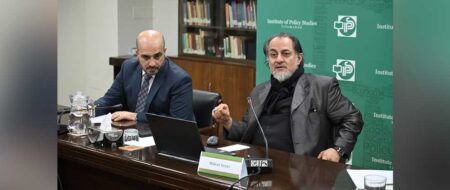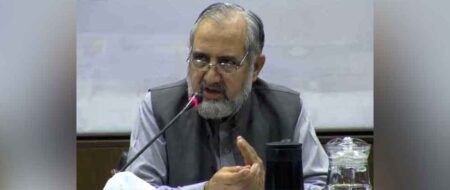Pakistan’s Energy Sector: Status and Prospects
Energy experts call for integrated planning, good governance
Energy experts in a policy roundtable have urged the government to promote integrated long-term planning in the energy sector and check lacunas in the management and implementation capacity of energy projects, especially those related to CPEC.
 The event titled ‘Pakistan’s Energy Sector: Status and Prospects’, which was held at IPS on January 10, 2016, was mainly addressed by Syed Akhter Ali, who has remained a part of the policy and planning process until recently as member energy in the Planning Commission and was chaired by Ashfaq Mahmood, former secretary, Ministry of Water & Power. The key discussants included former federal secretaries and energy policy analysts Masud Daher and Salahuddin Rifai, and IPS associates Brig (retd) Said Nazir and Ameena Sohail.
The event titled ‘Pakistan’s Energy Sector: Status and Prospects’, which was held at IPS on January 10, 2016, was mainly addressed by Syed Akhter Ali, who has remained a part of the policy and planning process until recently as member energy in the Planning Commission and was chaired by Ashfaq Mahmood, former secretary, Ministry of Water & Power. The key discussants included former federal secretaries and energy policy analysts Masud Daher and Salahuddin Rifai, and IPS associates Brig (retd) Said Nazir and Ameena Sohail.
Diamer-Bhasha dam should have been the top priority of Pakistan’s energy managers vis-à-vis CPEC strategization and negotiations but so far this most critical hydropower and water storage project for the nation has remained in the back-burner, lamented Ashfaq Mehmood. However, Akhtar Ali claimed that with the smaller projects the Chinese were ‘testing the waters’ in Pakistan and now the nation may soon receive the good news that the funds for Diamer-Bhasha project, either completely or partly, would come through CPEC and/or PSDP. WAPDA has already submitted a feasibility for it.
Syed Akhtar Ali was of the view that though there were still serious and chronic governance issues the energy sector in Pakistan was faced with, there was a silver lining that the multiple actors and forces in the regulatory regime were interacting gradually towards institutionalization of policy decisions and issues related to tariff allocation. The power generation target of 10,000MW increase of the present government will be somehow achieved by the end of 2018, however the distribution capacity issues will not allow an end to load-shedding. The future financial implications, in terms of debt and foreign exchange liabilities, were also yet to be realized.
It was revealed that except for some modelling efforts done by Asian Development Bank (ADB) there has been no serious attempt ever in Pakistan for an integrated energy planning through which the future energy demands of the country could be forecasted according to economic growth estimates.
The planning, management and implementation of the current energy projects was also criticized by the roundtable discussants. It was pointed out that the coal power plants in Punjab were being built without proper planning for transporting coal to them and the power generation projects in Sindh lack serious capacity issues for distribution. The same thing has happened with the Nandipur project earlier.
Regulatory tribunals were critically needed to allow right to appeal against decisions taken by the regulatory bodies, demanded Ameena Sohail.
The chair in his concluding remarks reiterated the need for integrated planning and good governance in the energy sector and urged that it was high time that we should own and plan our future now vis-à-vis the opportunities CPEC was bringing for us to meet our energy needs.
He commented that the sovereign guarantees for up to 30 years against tariff regimes cannot allow a competitive market for power generation. A roadmap must be devised for it as in developed countries electricity was sold and purchased in the open market and this is much needed in Pakistan as well.












